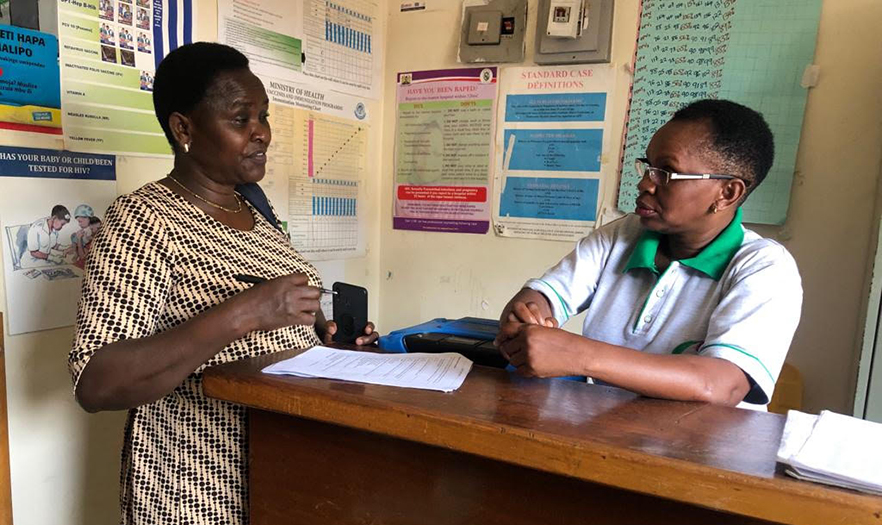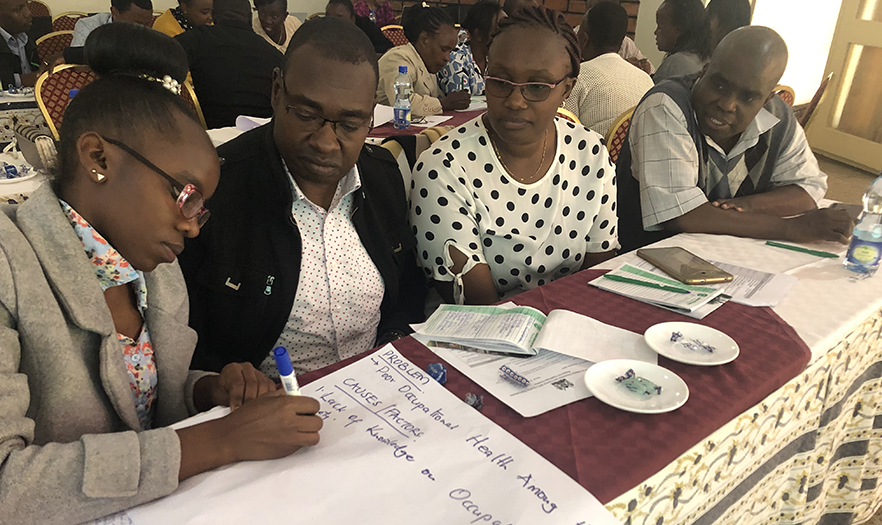A Quality Improvement Program for IPC Launched in Kenya
Approximately 10% of hospital procedures in low- and middle-income countries result in a health care-acquired infection. Containing those infections is an integral component of a quality health care system and is particularly critical as the world grapples with the COVID-19 pandemic. It’s also key to containing antimicrobial resistance.
The USAID MTaPS Program has been supporting 16 facilities in Kenya’s Nyeri and Kisumu counties since July 2019 to implement a continuous quality improvement (CQI) process in infection prevention and control (IPC) procedures. The CQI process, which Kenya’s Ministry of Health developed, involves health care workers and facility managers in monitoring and implementing ongoing proactive improvements to provide safe, quality health care.
Assessment identifies gaps in hygiene, waste management
In September 2019, MTaPS provided two training of trainers courses in basic IPC standards to 68 health care workers from 2 counties, who then went on to train others in their facilities. The CQI process reinforces those lessons learned and helps facilities track their progress.
In two MTaPS-supported counties, Nyeri and Kisumu, the program began by introducing the CQI approach for teams at the county and facility levels to get their buy-in, ownership, and leadership. The teams conducted a baseline assessment in each MTaPS-supported facility to assess gaps and strengths. The assessments covered water, sanitation, and hygiene; hand hygiene; occupational health and injection safety practices; and data management.
The key gaps identified included a lack of IPC policies, guidelines, and training among health care workers. There were issues with how waste was categorized and a lack of proper hand hygiene, such as washing hands before and after touching patients, among other inadequate IPC practices.

A data expert interviews hospital staff at Outspan Teaching and Referral Hospital, Nyeri County. (Photo: Doris Bota, MTaPS)
IPC Continuous Quality Improvement Program
In November, MTaPS, in collaboration with Kenya’s Ministry of Health and county health management teams, trained 62 IPC CQI champions selected from county health management teams and 16 focus health facilities. The two-day trainings helped the teams, which included medical superintendents, hospital administrators, IPC trainers, and lead nurses, learn how to assess initial progress and make plans for improvements according to national IPC objectives.
During the CQI training, MTaPS disseminated the findings of the IPC baseline assessments, which served as the basis for setting targets and measuring progress of future interventions. The IPC teams then planned facility improvement projects for the next six months. They will share lessons learned with their health facility managers and health care workers throughout the one-year work plan.
The IPC interventions included:
- Establishing formal IPC committees with clear terms of references
- Holding IPC trainings at each facility for health care workers, including pharmacists, clinicians, nurses, and medical laboratory officers
- Establishing hand hygiene and waste management programs
- Providing ongoing IPC education and training for new staff
- Appointing full-time IPC coordinators
- Providing Hepatitis B vaccinations for staff
- Sharing IPC information through benchmarking visits and conferences
MTaPS, in collaboration with county health managers and Ministry of Health champions, conducted quarterly supportive supervisions and mentorships in the facilities.
The county IPC advisory committee will continue to mentor IPC leaders and conduct supportive supervision in health facilities, using virtual meeting platforms whenever possible to minimize risk during the COVID-19 pandemic.
The IPC activities are part of MTaPS’ bigger strategy in Kenya to contain antimicrobial resistance in support of the Global Health Security Agenda.

Participants develop an IPC policy statement during a training at Outspan Teaching and Referral Hospital, Nyeri County. (Photo: Doris Bota, MTaPS)